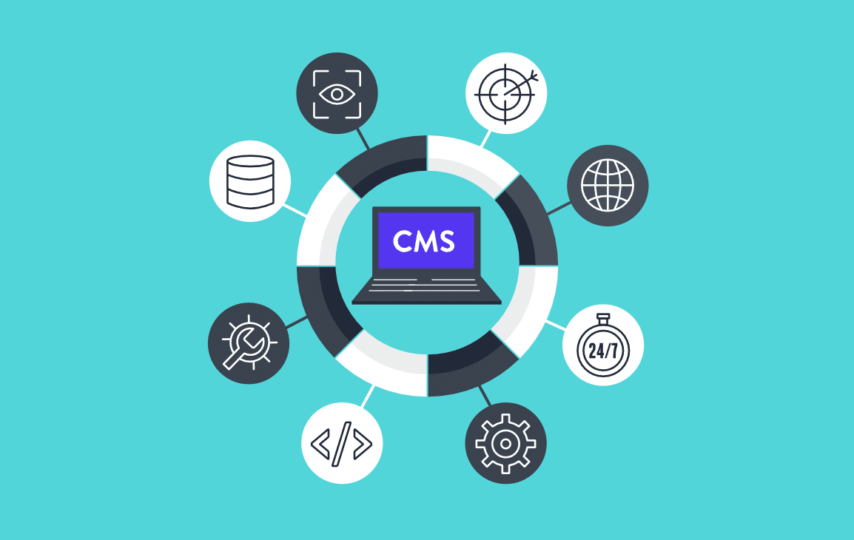Ever heard the term content management system but not sure what it is? In this guide, we’re going to provide you with all the information you need to know and help you decide if it’s the right way to manage your website.
So, to start off with, let’s answer the key question, what are content management systems?
Well, content management systems, or CMS for short, is a crucial part of any good website design project. They provide an organized platform of tools that allows you to manage the content on your website without the need to learn computer code.
Without knowing it, you’ve probably come across or even used a CMS without perhaps even knowing it. If you’re keen to understand the nuts and bolts of two of the most well-known systems, this Drupal Vs. WordPress comparison is a great place to start.
What Does a CMS Manage?
The answer is pretty much everything: titles, meta tags, text, layouts – even photos and videos. If you’ve ever updated a paragraph on a Word document using Track Changes, then created another version because you thought it looked better before checking in with everyone else – well, let’s just say… we’ve all been there!
Content management systems are designed to make that sort of nightmare scenario a thing of the past. You now have an easy way to update any website content without worrying about breaking anything else. This is what content management is all about – providing you with complete control over the site’s content without having to worry about causing problems with the underlying code
Different Types of CMS
As technology develops, then different types of CMS become available. There are a few different types that you need to be aware of:
Flat File System
There are many different CMS types out there, but the most commonly used type is called a ‘flat-file’ system. A flat-file CMS stores all its data in text files which you can edit directly through FTP (a standard method for uploading web pages).
Some examples are Joomla, Weebly SiteBuilder, and Wix. These sites are ‘open-source,’ which means you can freely download and install them, offering nearly unlimited customization.
Hosted CMS
The next most popular system is a ‘hosted’ CMS, where someone else hosts the site for you (just like on pretty much every website). The main advantage of hosted systems is that they’re straightforward to use – there’s no installation required, and they tend to be better designed. An example is WordPress, but this has become so popular it’s now even possible to find themes (templates) for other CMS platforms like Joomla!
This means if you like the way WordPress looks but wants more control over the content, you can simply switch everything over without rewriting any code or changing hosting providers.
Usually, hosted systems are based on flat-file platforms, but they often have extra features that make them more accessible for novices to use. For example, WordPress has a special backend to manage content more easily by dragging and dropping images onto pages.
This means you don’t need to edit your files directly through FTP which makes any changes safer – it’s easy to delete things or break the site if you don’t know what you’re doing!
Dynamic CMS
The final type of CMS is called a ‘dynamic’ system which usually uses databases instead of simple text files. This style of CMS allows administrators to create dynamic pages with all kinds of data pulled from various sources – just think how much information you can get on Facebook or Twitter.
These sites are often harder to use, but they offer the greatest flexibility. Examples include Drupal and Joomla.
Pros and Cons of CMS
Before leaping in and assuming you need a content management system, let’s take a look at the pros and cons.
Pros of CMS
- Ease of use – most CMS are drag and drop, making them very easy to use, even if you don’t know any code.
- SEO friendly – many CMS come with built-in SEO features that help you optimize your site for the search engines.
- Flexibility – most CMS offer great flexibility in terms of what you can do with your content. You can add new pages, change the layout, create custom templates, and more.
Cons of CMS
- Cost – some CMS can be expensive, especially if you need to hire someone to help you set it up.
- Learning curve – even though the basics can be very easy to pick up, most CMS still have a bit of a learning curve, especially the more complex ones. If you’re not familiar with coding or web design, it might take a while before you feel comfortable using a CMS. So don’t expect to leap in on day one and have your site organized and published.
- Security – as with anything that gives you access to your site’s content, there is always a risk of something going wrong. Make sure you choose a reputable provider and read up on security best practices.
This will include things like choosing a suitable username and password, staying up to date with patches, and making sure you don’t have any obvious security holes in your site.
Can I Build a Site Without Using A CMS?
Absolutely! You can build websites without using anything fancy at all. For simple sites, the best option is usually to simply use HTML (HyperText Markup Language) and CSS (Cascading Style Sheets).
Even if you don’t know any of these languages, there are plenty of resources that teach you how to build a website from scratch.
We recommend trying this approach first as it’s the best way to learn how things actually work. It will also save you a lot of money and time as there’s no need for any software or extra hosting costs.
Building a site from scratch is not that difficult, but it will take some time if you’re new to web design. You’ll have a learning curve ahead of you, but the good news is that most of your hard work can be reused on future sites.
If you’re already familiar with building websites in HTML and CSS, it’s actually pretty easy to create a new site.
This approach will teach you how web pages are built so that you’ll have a much better chance of fixing it yourself when something goes wrong in the future.
However, for most website projects, CMS will be the best way forward… especially if you want to hand over the responsibility of managing the site’s content to someone who doesn’t know how to code!








